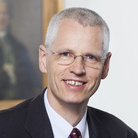Episode 21: The Fate of the Economy Post-Corona

Holger Schmieding
Berenberg Bank
Dr Holger Schmieding is Chief Economist at Berenberg in London. Before joining Berenberg in October 2010, Holger worked as Chief Economist Europe at Merrill Lynch, Bank of America and Bank of America-Merrill Lynch in London. Having studied economics in Munich, London and Kiel, he holds a doctorate from the University of Kiel. Prior to this, he also worked as a journalist at Westfälische Nachrichten in Germany, as head of a research group on east-central Europe at the Kiel Institute of World Economics and as a desk economist at the International Monetary Fund in Washington, DC.

Jeff Rathke
President of AGI
Jeffrey Rathke is the President of the American-German Institute in Washington, DC.
Prior to joining AGI, Jeff was a senior fellow and deputy director of the Europe Program at CSIS, where his work focused on transatlantic relations and U.S. security and defense policy. Jeff joined CSIS in 2015 from the State Department, after a 24-year career as a Foreign Service Officer, dedicated primarily to U.S. relations with Europe. He was director of the State Department Press Office from 2014 to 2015, briefing the State Department press corps and managing the Department's engagement with U.S. print and electronic media. Jeff led the political section of the U.S. Embassy in Kuala Lumpur from 2011 to 2014. Prior to that, he was deputy chief of staff to the NATO Secretary General in Brussels. He also served in Berlin as minister-counselor for political affairs (2006–2009), his second tour of duty in Germany. His Washington assignments have included deputy director of the Office of European Security and Political Affairs and duty officer in the White House Situation Room and State Department Operations Center.
Mr. Rathke was a Weinberg Fellow at Princeton University (2003–2004), winning the Master’s in Public Policy Prize. He also served at U.S. Embassies in Dublin, Moscow, and Riga, which he helped open after the collapse of the Soviet Union. Mr. Rathke has been awarded national honors by Estonia, Latvia, and Lithuania, as well as several State Department awards. He holds an MPP degree from Princeton University and BA and BS degrees from Cornell University. He speaks German, Russian, and Latvian.
__

Peter S. Rashish
Vice President; Director, Geoeconomics Program
Peter S. Rashish, who counts over 30 years of experience counseling corporations, think tanks, foundations, and international organizations on transatlantic trade and economic strategy, is Vice President and Director of the Geoeconomics Program at AICGS. He also writes The Wider Atlantic blog.
Mr. Rashish has served as Vice President for Europe and Eurasia at the U.S. Chamber of Commerce, where he spearheaded the Chamber’s advocacy ahead of the launch of the Transatlantic Trade and Investment Partnership. Previously, Mr. Rashish was a Senior Advisor for Europe at McLarty Associates, Executive Vice President of the European Institute, and a staff member and consultant at the International Energy Agency, the World Bank, UN Trade and Development, the Atlantic Council, the Bertelsmann Foundation, and the German Marshall Fund.
Mr. Rashish has testified before the House Financial Services Subcommittee on International Monetary Policy and Trade and the House Foreign Affairs Subcommittee on Europe and Eurasia and has advised three U.S. presidential campaigns. He has been a featured speaker at the Munich Security Conference, the Aspen Ideas Festival, and the European Forum Alpbach and is a member of the Board of Directors of the Jean Monnet Institute in Paris and a Senior Advisor to the European Policy Centre in Brussels. His commentaries have been published in The New York Times, the Financial Times, The Wall Street Journal, Foreign Policy, and The National Interest, and he has appeared on PBS, CNBC, CNN, NPR, and the BBC.
He earned a BA from Harvard College and an MPhil in international relations from Oxford University. He speaks French, German, Italian, and Spanish.
As governments shape their responses to the coronavirus pandemic, the economic impact of the crisis is growing. In the U.S., the surge in unemployment claims is four times greater than the previous peak. Germany, where the effects of the virus started earlier than in the U.S. thanks to its proximity and partnership with Italy, probably fell into a recession in March. Indeed, April is poised to be the worst month for the German economy in peacetime. How effective will government economic responses to the crisis be for workers, for small businesses, and for large corporations, and what will it mean for the global economy more broadly?
On this episode of The Zeitgeist, Jeff Rathke and Peter Rashish are joined by Holger Schmieding, Chief Economist for Berenberg Bank, to discuss the coronavirus crisis. They discuss the impact on globalization, whether European cooperation is effective, and how the crisis could affect perceptions of the German economic model. Should the U.S. be doing more to shape the international response to the crisis? And will the coronavirus spur innovation and technological advances?
Host
Jeff Rathke, President, AGI
Guests
Holger Schmieding, Chief Economist, Berenberg
Peter Rashish, Senior Fellow and Director, Geoeconomics Program, AGI





